The field of bariatric surgery is constantly evolving as we discover new procedures that are safer and less invasive. The never-ending search of a more physiological and less complex surgery has led surgeons to develop novel procedures. It is important that you have access to the latest information and new developments about bariatric surgery, so that you can make the most informed decisions about your health.
Some emerging bariatric therapies and technologies, such as the Duodenojejunal bypass (SG-DJB) and Ileal tansposition (SG-IT), are already being implemented because they are safer and more effective for some patients than historical alternatives.
Laparoscopic Novel procedures:
Ileal Interposition
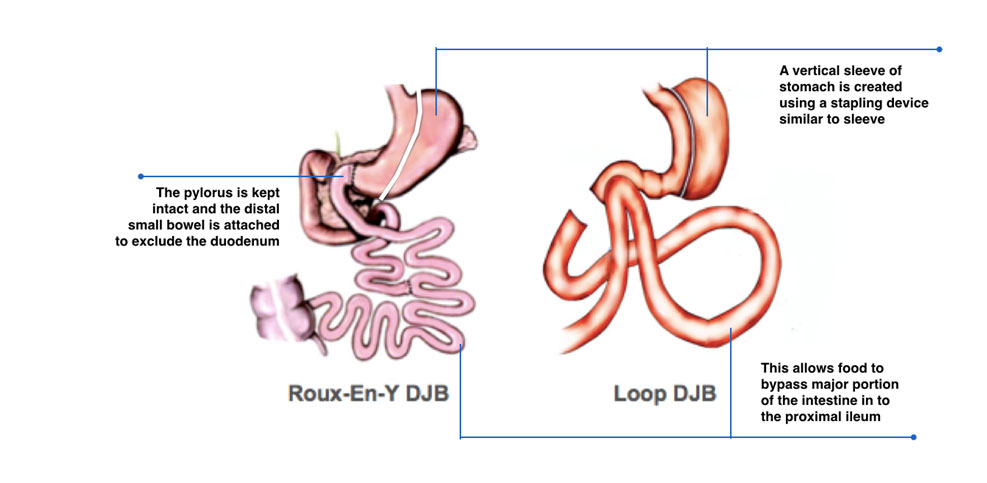
Ileal interposition, previously called "transposition," is a procedure being investigated to treat type 2 diabetes. Ileal transposition involves the removal of a small segment of the ileum with its vascular and nervous supply and inserting it into the proximal small intestine. This operation causes a surge in the body's insulin soon after taking food thus controlling post-prandial sugar. It also increases the insulin sensitivity of target cells so that fasting sugar levels dependent on liver are better controlled. Thus this operation controls sugar in the most physiological way by enhancing the effect of body insulin. The progressive destruction of insulin-secreting B-cells in pancreas is arrested. There are two types of IT, conventional where the procedure is more simple with resolution of Diabetes up to 90%. The more complex diverted IT gives more than 95% control of Diabetes am]nd other metabolic syndromes.
Duodeno-Jejunal Bypass
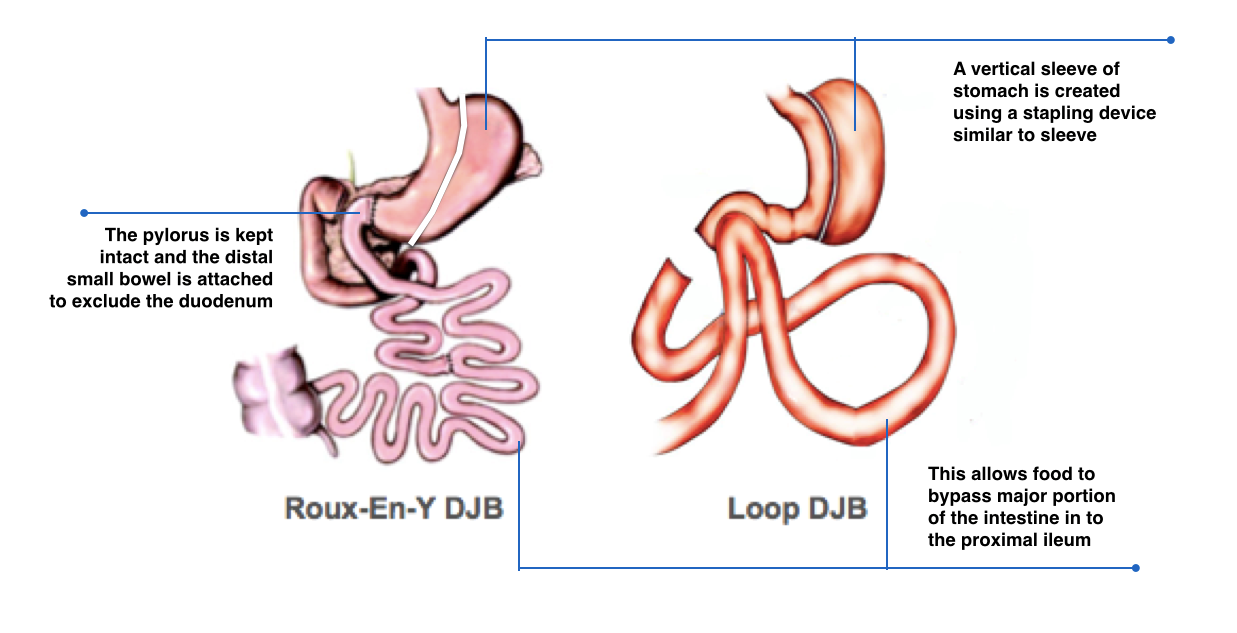
Duodenal-jejunal bypass is a stomach sparing bypass of a short segment of the proximal intestine, a gastric bypass without the stomach stapling or creating a micro pouch. Duodenal-jejunal bypass has been shown to improve diabetes in both lean and obese patients It is currently being investigated in select early human trials. Published data on a sampling of cases shows that normal-weight type 2 diabetic patients undergoing duodenal-jejunal bypass had normalized fasting blood glucose levels < 100 mg/dl. A1C dropped to < 6%, from a preoperative level of 8‐9% . It is expected that this procedure might duplicate the well-described safety profile of the Roux-en-Y gastric bypass for non-obese diabetics with better control of Diabetes. However long term studies are awaited to recommend this procedure for routine clinical practice.
Other widely used novel surgeries are:
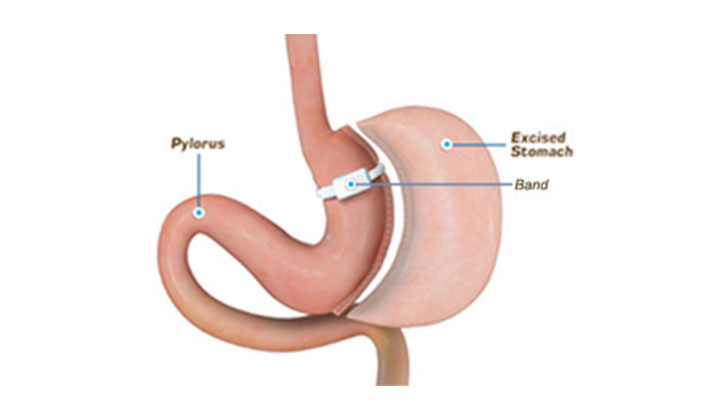
Banded sleeve (novel)
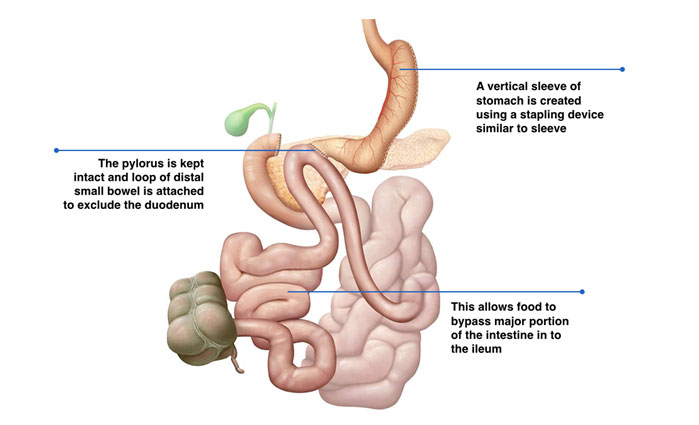
Single Anastomosis Duodeno-Ileal Surgery - SADI (Novel)
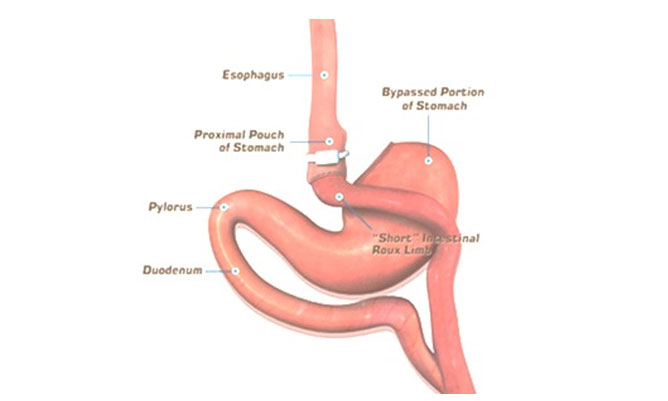
Banded bypass (novel)
Endoscopic Bariatric Procedures
Most emerging bariatric procedures are less invasive trans-oral surgeries known as endoscopic bariatric therapies (EBT) because most of these treatments are completed with an endoscope that uses novel surgical instruments. This is all placed down the throat, removing the need for surgical incisions.
VBLOC
VBLOC (EnteroMedics) is an implantable electrical nerve-blocking device. It works by blocking some of the nerve signals from the stomach to the brain, which decreases hunger. Although this device is FDA-approved, at this time the device is expensive and results in significantly less weight loss (only 24% excess weight loss*) than more standard surgical approaches.
Endoscopic Sleeve Gastroplasty
Endoscopic Sleeve Gastroplasty (ESG) also called Transoral Sleeve Gastroplasty, is an endoscopic procedure that involves placing stitches inside the stomach to reduce stomach size, similar to a traditional sleeve gastrectomy. The procedure is performed endoscopically, down the throat. This makes the surgery less invasive than even laparoscopic surgery.
This procedure is still in its early stages, but initial results indicate two concerns:
- Weight Loss: weight loss is only about half that of the operative sleeve gastrectomy (35% excess weight loss).
- Durability: endoscopic sutures are more likely to pull through with time, which can negatively impact long-term weight loss and perhaps even cause other complications. Due to these concerns, we don't recommend the endoscopic sleeve gastroplasty or the VBLOCTM to our patients at this time. However, as these therapies continue to evolve, our ongoing assessment will also continue. If they become more beneficial to patients, our recommendation may change.
These emerging bariatric technologies and therapies rarely replace initial bariatric surgery, but are increasingly being used in revisional bariatric surgery. After a gastric bypass, for instance, the gastric pouch can sometimes stretch, resulting in weight regain. Revisional bariatric surgery can help this problem. Few emerging bariatric surgeries, the Endoscopic ROSE (Restorative Bariatric Surgery , Endolumenal), Endoscopic Outlet reduction Surgery (Overstitch), and the APC (Argon Plasma Coagulation) can help with this revisional surgery. These procedures can sometime help avoid a more complex and a possible morbid revisional laparoscopic bariatric surgery.

